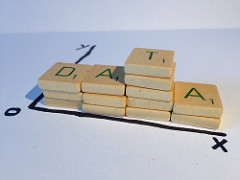The Oxford English Dictionary defines organized as: “Of a person: having one's affairs in order so as to be able to deal with them efficiently.”
When you spend the best hours of your day doing research and working with data, it makes sense to be organized so you can use your time as efficiently as possible. One of the methods for maintaining an organized research life is by developing a data management plan (DMP).
 Many researchers have become familiar with the phrase “data management plan” when needing to write one to accompany a grant application to a government funding agency. While it’s admirable that the grant agencies are now requesting these plans, a comprehensive DMP can be an extremely valuable document to have in place for managing a lab or a specific research project. Kristin Briney, in her book “Data Management for Researchers” states “At its core, a data management plan is a document that lays out how you will deal with your data…. the best way to improve your data management practices is by planning ahead and the data management plan is the thing that actually codifies what you will do.” When done well, a data management plan can:
Many researchers have become familiar with the phrase “data management plan” when needing to write one to accompany a grant application to a government funding agency. While it’s admirable that the grant agencies are now requesting these plans, a comprehensive DMP can be an extremely valuable document to have in place for managing a lab or a specific research project. Kristin Briney, in her book “Data Management for Researchers” states “At its core, a data management plan is a document that lays out how you will deal with your data…. the best way to improve your data management practices is by planning ahead and the data management plan is the thing that actually codifies what you will do.” When done well, a data management plan can:
- provide guidance throughout an entire project for how data is organized and cared for.
- introduce the data to new researchers who join the project throughout its lifespan (graduate students, undergraduate researchers, post-docs).
- allow researchers to easily find and use data created by others working on the project.
- make it easy to create metadata and readme documents at the end of a project when transferring data from the lab to an archive or repository.
A basic DMP should have at least the following elements, but can and should be expanded as necessary to be useful for the duration of a research project.
- Description (including types and formats that will be produced, estimated total size)
- Storage (where the data will be stored during the project and any security measures)
- Organization and documentation (how the data will be organized and documented during the project)
- Preservation (where the data will go after completion of the project)
- Sharing and reuse policies (how the data will be shared with others and what they can do with it)
If writing a DMP as part of a grant application, be sure to consult the funding agency’s guidelines and provide the required information while conforming to any page or word limits. Ideally, a project will have multiple versions of a DMP - a comprehensive one for actual use during the project to stay organized, and an abbreviated one that can be submitted with a grant application. For more information about writing a DMP for a funding agency, take a look at U-M Library’s DMP Guide. The guide is presented from an engineering perspective, but contains information that is useful for writing a DMP in any field.
If you’re a researcher in the College of Engineering and would like your DMP to be reviewed before it is submitted with a grant application or would like more information about staying organized during a research project, you’re welcome to use our DMP Review Service by sending your question or DMP along with a little info about your research to enginDMPhelp@umich.edu. Otherwise you can email researchdataservices@umich.edu or contact your subject librarian and let her/him know that you’re interested in a data consultation.
Sara Samuel is an engineering librarian at the Art, Architecture and Engineering Library. She completed ICPSR’s summer course “Curating and Managing Research Data for Re-Use” in 2013 and is currently co-teaching a 2-credit course for graduate students on managing data in the climate and space sciences.
References:
"organized, adj.". OED Online. December 2015. Oxford University Press. http://www.oed.com/view/Entry/132457?redirectedFrom=organized (accessed February 08, 2016).
Briney, K. (2015). Data management for researchers: organize, maintain and share your data for research success. Exeter, UK: Pelagic Publishing. p. 19. Available online through U-M Library at http://mirlyn.lib.umich.edu/Record/014015044
“Research Data Management” by janneke staaks via Flickr (CC BY-NC 2.0)